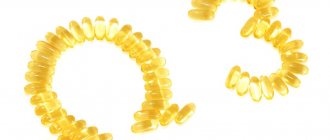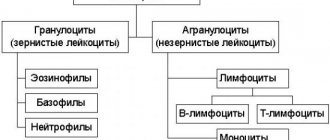Fish oil occupies a special place in the list of unique and healthy products for children. The fat contains antioxidants, vitamins A and D, as well as Omega-3 fatty acids (unsaturated), I, Br, P, various salts and bile pigments. It is synthesized from certain types of marine fish (mackerel, herring, etc.). Improves well-being, ability to resist viruses and recover, absorb Ca and P. The substance appears to have a viscous, thick consistency, with a tint ranging from reddish to light yellow. The substance is distinguished by a specific fishy smell and taste, indicating the natural origin of the product.
Best before date
12 months
Vitamins with similar effects
- Shiitake (Capsule)
- Aleroton (Capsule)
- Incas gold. Men's Formula (Oral Tablets)
- Golden root-Rhodiola Rosea-Artlife (Capsule)
- Immun44 syrup (Syrup)
- Immune plus (Oral tablets)
Description of the vitamin Fish oil for children is intended for informational purposes only. Before starting to use any drug, it is recommended to consult a doctor and read the instructions for use. For more complete information, please refer to the manufacturer's instructions. Do not self-medicate; EUROLAB is not responsible for the consequences caused by the use of information posted on the portal. Any information on the project does not replace consultation with a specialist and cannot be a guarantee of the positive effect of the drug you use. The opinions of EUROLAB portal users may not coincide with the opinions of the site Administration.
Are you interested in Vitamin Fish Oil for Children? Do you want to know more detailed information or do you need a doctor's examination? Or do you need an inspection? You can make an appointment with a doctor - the Euro lab is always at your service! The best doctors will examine you, advise you, provide the necessary assistance and make a diagnosis. You can also call a doctor at home . Euro lab clinic is open for you around the clock.
Attention! The information presented in the vitamins and dietary supplements section is intended for informational purposes and should not be a basis for self-medication. Some of the drugs have a number of contraindications. Patients need to consult a specialist!
If you are interested in any other vitamins, vitamin-mineral complexes or dietary supplements, their descriptions and instructions for use, their analogues, information about the composition and form of release, indications for use and side effects, methods of use, dosages and contraindications, notes about the prescription of the drug for children, newborns and pregnant women, price and consumer reviews, or you have any other questions and suggestions - write to us, we will definitely try to help you.
How is fish oil good for children?
This product is a real storehouse of useful substances that a child’s body needs so much.
Natural fish oil contains polyunsaturated fatty acids and is the most important source of Omega-3 acids for children. In addition, it contains vitamins A and D, a number of macro- and microelements (calcium, sodium, zinc, magnesium, iodine, iron, phosphorus, etc.). Omega 3-6-9 Super, 45 capsules, Evalar
785 ₽
Dietary supplement NOT A MEDICINE
Fish oil is a very healthy product. Among his many “talents”:
- beneficial effects on the growth and development of bones and teeth
, on the condition of hair and nails; - maintaining vision
; - strengthening the immune system
and protecting against infections; - antioxidant
properties; - maintaining memory and attention
; - increasing resistance to stress
; - reduction of irritability
and increased excitability.
Baby Formula Bear Calcium, 60 chewable lozenges, Evalar
439 ₽
Dietary supplement NOT A MEDICINE
Benefit
During the period of active growth, children need foods rich in unsaturated fatty acids. Fish oil improves brain function and performance indicators. It becomes a source of additional energy, which has a beneficial effect on the progress of children’s learning and development.
The benefits of fish oil in capsules are evidenced by the following data:
- Thanks to fish oil, vitamins A, K, D, F, E are more easily absorbed by the child’s body.
- Vitamin D takes an active part in the formation and strengthening of the bone structure of the child’s body, as well as in the absorption of Ca and P.
- Vitamin A is involved in the formation of a strong cell membrane, which is reflected in a decrease in allergic manifestations, an increase in visual acuity, etc.
- Vitamin E - has the ability to neutralize oxidizing substances, is necessary for the formation of strong muscles and normalization of blood clotting.
- P is an element without which the proper formation of the nervous system, kidney function, and development of bone structure and teeth are impossible.
- I is a substance that copes well with developmental disorders of the child’s body (apathy, low mental abilities, drowsiness).
- Omega-3s are unsaturated fatty acids that are the main component of a strong immune system and a healthy cardiovascular system.
Children's fish oil is a unique component responsible for:
- Health of teeth and bones;
- Regulating the degree of nervous excitability;
- Brain activity;
- Formation of the immune system;
- Normal condition of skin and hair;
- Restoration and functioning of mucous membranes.
Fish oil capsules affect:
- Formation of a good mood;
- Reducing manifestations of aggression;
- The full value of restorative sleep;
- Disappearance of nervousness;
- Relief from cramps;
- Successful prevention of obesity;
- Intensity of wound healing;
- Getting rid of anemia;
- Memory improvement.
The benefits of fish oil are undeniable, so a rational approach to the preventive and therapeutic capabilities of the substance will allow them to be used most effectively to create a healthy and strong younger generation.
When can you start feeding your child fish oil?
Can I give my child fish oil? At what age can a baby take it? The instructions for use of the drug contain all the necessary information about the exact cases in which it is indicated, and what dosage is recommended for children of different ages. According to these instructions, fish oil in liquid form can be given to a child from three months. But fish oil in capsules - from the age of seven.
Fish oil for children, chewable, lemon flavor, 100 capsules, BIOCONTOUR
146 ₽
Dietary supplement NOT A MEDICINE
In addition, today Omega-3 preparations with vitamins for children are produced in such convenient forms as chewing candies and capsules with fruit flavors or, for example, in powder form for adding to food.
Of course, it is recommended that your child begin taking fish oil or other Omega-3 medications after consulting with a pediatrician.
Side effects
Fish oil in small doses has a beneficial effect on the body, but in some cases it can harm the child’s health. Possible side effects include:
- indigestion - exceeding the permissible dose of the drug can cause heartburn and diarrhea;
- vitamin poisoning - an excess of vitamins A and D in a large dose of a food supplement disrupts the functioning of body systems, affects blood pressure and leads to intoxication;
- heartburn and belching are common negative effects of the product on the child’s body;
- increased blood sugar - oversaturation with fatty acids stimulates the production of glucose;
- bleeding - an overdose of fish oil increases the risk of blood in the urine and nosebleeds;
- Heavy metal poisoning – some types of fish can accumulate pollutants and toxic substances from the environment. Consuming a poor quality supplement can cause nausea, vomiting, kidney damage and anemia.
Analogs
In special cases, taking fish oil is contraindicated, but this does not mean that the child does not need a source of fatty acids. A good substitute would be flaxseed oil, which is considered the best natural source of Omega-3. The oil can be purchased both in pure form and in capsule form.
Among the medications, Vitaton Multiomega can be distinguished. Children will love the tasty syrup and will be an excellent alternative to fish oil. The drug is taken for a month once a day.
According to experts, consuming fish oil has a positive effect on the child’s body, but an excess of the dietary supplement can harm the baby. To avoid undesirable consequences, before giving the drug to a child, parents should consult a doctor who will determine the exact dosage of the drug.
Omega-3 Rich Foods
Omega-3 fatty acids come in plant and animal sources. Plants include ALA (alpha-linolenic acid), animals include DHA (docosahexaenoic acid) and EPA (eicosapentaenoic acid). Research shows that only 10-20% of plant Omega-3s are absorbed by the body¹.
That is why sea fish, as well as fish oil in capsules, are preferable to take than plant sources of Omega-3. At the same time, farmed salmon can be considered even more useful than wild salmon - beta-carotene is used to give it a reddish color, the fish contains vitamin A, which is important for immunity and metabolism.
| Total Omega-3 Content | Omega-3 fat profile, g | |||
| A.L.A. | DHA | EPA | ||
| Flaxseed oil, tablespoon | 7.3 g | 7.3 g | – | – |
| Chia seeds, 30 g | 5 g | 5 g | – | – |
| Walnuts, 30 g | 2.6 g | 2.6 g | – | – |
| Salmon, cooked, 100 g | 1.5 – 1.8 g | – | 1.2 – 1.3 g | 0.3 – 0.5 g |
| Herring, cooked, 100 g | 1.6 – 1.8 g | – | 0.9 – 1 g | 0.7 – 0.8 g |
| Canola oil, tablespoon | 1.3 g | 1.3 g | – | – |
| Canned sardines, 100 g | 1.1 – 1.3 g | – | 0.7 – 0.8 g | 0.4 – 0.5 g |
| Trout, cooked, 100 g | 0.8 – 0.9 g | – | 0.4 – 0.5 g | 0.4 g |
| Sea bass, cooked, 100 g | 0.5 – 0.7 g | – | 0.4 – 0.5 g | 0.1 – 0.2 g |
| Prawns, cooked, 100 g | 0.2 – 0.3 g | – | 0.15 g | 0.15 g |
| Canned tuna, 100 g | 0.1 – 0.3 g | – | 0.1 – 0.2 g | 0.05 g |
| Beef, cooked, 100 g | 0.05 g | 0.05 g | – | – |
Flaxseed oil as a source of Omega-3
Despite the fact that flaxseed oil (just like flaxseed) contains a significant amount of Omega-3 fatty acids, only a small proportion of these will be fully absorbed by the body. To cover your daily requirement, it is important to drink at least a tablespoon of flaxseed oil per day.
The same applies to chia seeds - to cover the daily requirement of Omega-3, you need to consume at least 30 g of such seeds per day. Although it is most practical to cover the need for these fatty acids through various sources, including fish oil.
How to take liquid fish oil
Basically, liquid fish oil is intended for drinking by children, but it is also preferable for athletes, as it is absorbed faster and more completely.
Adults, unless otherwise prescribed by a doctor, can take the fatty liquid 2 tablespoons twice a day.
The maximum dose, considering that 1 tablespoon contains 15 ml of fat, should not exceed 90 ml. Those who drink such doses of fat should monitor ESR levels after completing the course (3 months).
How to take fish oil for weight loss
Those who are planning to include fish oil in their own weight loss program should understand that it is an auxiliary aspect - it does not burn fat deposits and does not contribute to passive weight loss.
Fish oil will only produce results in combination with sports exercises - it only speeds up slow metabolism and helps build protein, uses fat for energy, utilizing it first. But if the body does not waste energy, the fat will remain intact.
For weight loss purposes, it is better to take liquid fish oil, but capsules will also work great.
- The liquid form is drunk 2 tablespoons in the morning after breakfast and an hour and a half before training, but after meals.
- Fat capsules for weight loss are taken with food, 2-3 pieces three times a day, with 200 ml of water or juice.
Daily intake of Omega-3 for children of different ages
When determining the daily requirement of healthy fats, international associations are guided by the most important acid - DHA. Its concentration in the composition is fundamental when calculating the rate of use. For each age group, the dosage of pure omega-3 for children or in fish oil is outlined in the table below.
This is the minimum specified in WHO recommendations:
| Age, years | Norm mg DHA, per kg of weight | Daily requirement, mg |
| 0,5–2 | 10-12 | 50-100 |
| 2-4 | 100-150 | |
| 4-6 | 150-200 | |
| 6-8 | 200-250 | |
| 8-10 | 250 |
Many scientists believe that children and adults should take orders of magnitude large doses of polyunsaturated acids for strong immunity, normal development and all vital processes. But fatty acids can accumulate in the body, so you should not drink high doses for a long period of time. The use of any supplement must be justified and comply with international standards.
Below are dietary guidelines for omega-3s published by the American Pregnancy Association.
Omega 3 for children from one year to one and a half years
Children from one year old with a body weight of 5 kg should receive 30-35 milligrams of DHA + EPA per day per kg of body weight, that is:
- with a weight of 5-10 kg - 150-300 mg DHA + EPA;
- with a weight of 10-15 kg - 300-450 mg DHA + EPA;
- Preterm infants weighing up to 7 kg should receive 32 mg DHA + EPA per kg of body weight.
Omega 3 dosage for a child 2-4 years old
For a two-year-old child, the need for omega-3 is calculated according to a similar scheme:
- with a weight of 10-15 kg - 300-450 mg DHA + EPA;
- with a weight of 15-20 kg 450-600 mg DHA + EPA;
- on average 32-34 mg per 1 kg of body weight.
Omega-3 intake standards for children 5,6 and 7 years old per day
At 5, 6, 7 years of age, the phase of active growth and development begins, so the dosage of omega-3 reaches approximately 500 mg per day. Based on body weight, the need for nutrients varies:
- up to 20 kg – about 600 mg;
- from 20 to 30 kg – from 600 to 900 mg.
Omega 3 dosage for children 8,9 and 10 years old
Correctly calculating the norm of omega-3 fatty acids for a child aged 8, 9, 10 years is more difficult, due to significant differences in physical development and nutrition. The American Pregnancy Association recommends a minimum dose of 15 mg of DHA + EPA. The European Food Safety Authority (EFSA) recommends starting the use of fish oil and preparations with unsaturated fatty acids at 250 mg per day.
Omega 3 dosage for children 11,12 and 13 years old
For adolescents aged 11-13 years, the daily requirement for drugs with omega, according to the recommendations of Russian scientists, should reach 1000 mg, approaching the adult intake rate. Experts from the American Association indicate a figure of 600-900 mg per day for a body weight of 30 kg or more.
Doctor's recommendation
Sandy Newmark, MD, director of the Pediatric Neurodevelopmental Program, recommends that children ages 4 to 6 years take 500 mg of omega fatty acids DHA+EPA daily, and children ages 7 and older take 1,000 mg daily.
the dosage of omega preparations depends on the age of the child
The body's need for PUFAs at different ages
It is logical that an adult needs much more fish oil than infants. But for small developing organisms, the consumption of polyunsaturated fatty acids is more important than for an adult, who can easily survive a severe deficiency.
Doctors agreed that the daily norms of fish oil for different ages are within the following limits:
| Age in years | Requirement in grams |
| Infants up to one year | 0,5 |
| 1-3 | 0,7 |
| 4-8 | 0,9 |
| 9-13 | 1-1,2 |
| 14 and older | 1,2-1,6 |
Residents of coastal regions, whose diet constantly includes fish and seafood, easily receive this dosage from food. The fish reaches central Russia several times already frozen and having lost almost all its beneficial properties. And some people simply do not like fish products, and it is impossible to get enough Omega-3 from other sources; fish oil is a champion in this regard.
When fatty acids enter the body, they are primarily sent to the brain and internal organs. There are no longer enough PUFAs for the skin, it begins to crack and peel. Dehydrated joints become inflamed and arthritis occurs. The mucous membranes begin to dry out. These symptoms are a sign of severe Omega-3 deficiency and need to be treated urgently.
It is advisable to consult a qualified nutritionist who will review the patient’s usual diet and determine whether he is getting enough healthy fats. If not, then you can start taking supplements. The maximum daily intake of Omega-3 for adult women and men has not been determined. If you have severe dry skin and mucous membranes, a tendency to depression or a constant feeling of fatigue, you can take large doses without fear of overdose. But consumption in amounts of more than 3 g is still not recommended.
Important point! Fish oil can be refined to Omega-3 or unrefined. In the unrefined form, especially if it was obtained from the liver, vitamins D and A are retained. This must be taken into account if other cholecalciferol supplements are taken. An excess of vitamin D is more dangerous than a deficiency.











